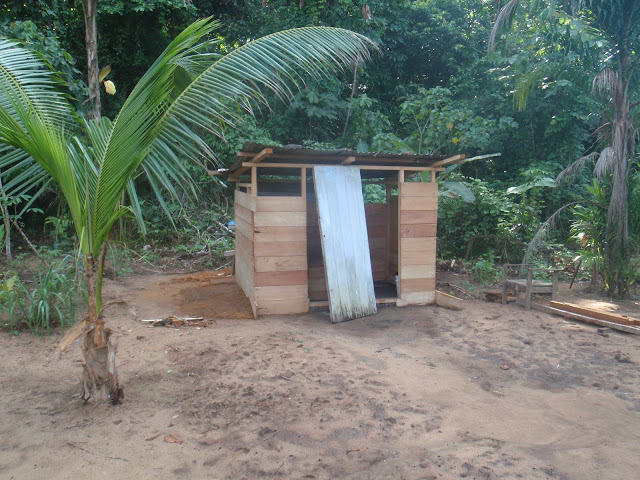Following (in this post and next ones) are some observations from our time here in Suriname, mostly from Mike's rookie perspective.
Daily Life in Tutu
We lucked out and have a nice, well-constructed (= fewer critters inside), rather tall (= less crouching), 2 room house to live in. Pretty simple, pretty comfortable.



After the first week of walking across town to use a latrine (sometimes 5 minutes can be too far...), we now even have a new pit latrine right out our back door.

(it's the little things in life that can make a big difference)
Our daily routine generally consists of waking up around daybreak (give or take an hour), working out, eating some sort of simple breakfast (often involving peanut butter), then going to the creek to wash dishes, clothes, and ourselves.

(the rocks are useful for washing clothes, setting down dishes, and for the random kid rock jump. It's only a few feet deep so we don't do too much jumping)

(looking the other way down the creek)
Traditionally, women carry heavy loads on their heads, a skill that Jill picked up while living here previously. She's still got it!

Back at the house, it's usually time to start cooking lunch (and dinner, cooking enough at once to get 2 meals out of it). Most of the time rice with veggies are in store, assuming we have some from the city (stay good around 1 week) or have earned some by going to ground to work the fields with some ladies. Jill is much better about earning veggies than Mike. She likes weeding and loves to get out into the jungle. I don't mind labor, but weeding is just not my thing (especially in a jungle, where pulling weeds seems incredibly futile). That attitude (of me trying to get out of important labor) fits with the usual gender roles within Saramaccan culture. That's about the only gender role that fits so well...

(the trail back to Resida's ground)
 (an overview of her area to be worked/planted)
(an overview of her area to be worked/planted) (Resida pickin' the goods)
(Resida pickin' the goods)
(it was watermelon season during January, and when it's watermelon season, it's WATERMELON season. There is an excess of watermelons everywhere with a surprising lack of variety of other fruit/veggies available at the time. For the jungle being so conducive to plant growth, not many fruit/veggie options at any given time)
Saramaccans find it hysterical that Mike helps with dish/clothes washing chores. A few women at the creek have positive comments regarding me helping out, but usually people are perplexed by why the man of the relationship would do such a thing. And when Bai's father found out that Mike cooked breaded fish that he tried, he laughed out loud for a good 10 minutes. It really doesn't help Mike's case that he goes to the jungle without a gun, helps out at ground, washes dishes/clothes, etc. Men don't do any of that. Men go to the jungle to hunt for meat. And sometimes they're successful.
In the past few months there have been 3 tapirs killed by people in Tjaicondre (neighboring village) and Tutubuka. There are some traditions/rituals practiced at the kill site, but then the animal is brought back to the village to be parted out to all (or mostly all). The hunter and his family receive a large portion and then other pieces are doled out.
 (the hunter taking his portion of bofo, or tapir, back to his family. Most they will eat, some of it they will sell to other people around town who didn't get their own portion)
(the hunter taking his portion of bofo, or tapir, back to his family. Most they will eat, some of it they will sell to other people around town who didn't get their own portion) (the butchering and parting in progress)
(the butchering and parting in progress)
(the only evidence remaining after less than 2 hours!)
Saramaccans generally share their food within the community. As mentioned, food is a common form of payment for helping out. Also, "living well" with the community often means that you cook up a dish and share portions with your friends and neighbors. (However, some friends and neighbors are better than others at keeping that a 2-way street.) It is also completely acceptable to ask for food from anyone eating. Often times people eating something as we are walking past will offer us a spoonful to try.
Along a similar line of sharing, Saramaccans are very used to sharing their space. Private space is minimal. Everyone's door is open as soon as they wake up, only closing when they are away from home or sleeping. Sometimes that can be fantastic, sometimes very overwhelming. It's usually the more calm times that we're able to get a couple of pictures.



Some other Highlights of Daily Life:
Electricity generally comes on daily from 7pm to 11pm. Otherwise it's really dark and hard for both Jill and me to read by candlelight.
Soccer games on Sunday - teams come from neighboring villages on the river to play soccer, complete with jerseys, refs, and cold beer for the spectators.

Towels are acceptable attire - usually only in the "neighborhood" around your own house, but how great is that?!?
No comments:
Post a Comment